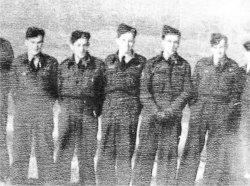
The modest heroes to whom we will be forever indebted
Over the past four weeks, to mark the 65th anniversary of the D Day landings, Rev Canon Alex Cheevers has been interviewing Lisburn war veterans who served their country on D Day. This week he finishes the series by speaking to a quiet, unassuming Lisburn RAF man
 THE
week's D Day veteran asked me not to identify him. He has always avoided
publicity and does not consider himself to be a hero.
THE
week's D Day veteran asked me not to identify him. He has always avoided
publicity and does not consider himself to be a hero.
Bill was born in Northern Ireland and for many years he has lived in Lisburn. But in 1940" when he was 17, war had broken out and he tried to join the Army.
"My friends and I could think of nothing else only 'Let's get in there before this war is all over'"" said Bill.
He was too young to join the Army but on 1st April 1941 Bill joined the Royal Air Force and was sent to the United States to be trained by the Americans as a pilot. When he returned to the UK as a qualified pilot he had to get used to flying in the British weather - and how to evade barrage balloons.
"They then sent me to Operational Training. After that I did a spell when I spent day after day helping to train paratroopers. I'd get new paratroopers on board, take off, circle and fly over the dropping area, and let them jump. Then I'd land again - and repeat. It wasn't very exciting but I was building up experience as a pilot.
"Next I was sent to No. 570 Squadron to work in support of the Army and ground forces. At that time I flew a lot of operations over France, dropping arms and supplies to the French Resistance. That was difficult work. The flying was all done on moonlit nights so we were trying to find the right field in France where the Resistance were waiting."
Then came the training for D Day. "I was training to fly the Albemarle as a tow-plane for Horsa gliders to land soldiers at D Day. The Horsas were bigger than the Albemarles and it was a special flying technique. We had to climb very slowly and depended on the glider pilots not allowing their glider to climb much higher than the plane. If they got higher than us they would pull our tail up and we would all crash."
During the hours of darkness before the D Day landings, Bill and his crew took off towing a glider. His group took Major General Gale and the Headquarters Staff of the 6th Airborne Division who were to land in fields not far from Pegasus Bridge to command the Airborne Operations. Heavy casualties were expected. Many of the gliders broke their towropes crossing the English Channel and crashed in to the sea. Others fell victim to German flak once they reached the French coast.
"It was difficult"" Bill recalls. "We had a lot of flak coming up at us from the ground but I didn't think too much about it. I had so many other aircraft and gliders all around me that I was too busy trying to make sure I didn't collide with them. Then our glider pilots radioed 'We can see our landmark. We're casting off'. And away they went to land in fields short of the Bridge. Two weeks later the glider pilots came home and told us that our navigation had been perfect. We felt good about it."
D Day was very satisfying for Bill. "We got off lightly," he said. It was to be a different story for him later in the war at Arnhem. But that's a story for another day.
Looking back on the war" Bill said" "It was one of those things that you had to do." He doesn't see himself as a hero. I would respectfully disagree with him. To him" and so many others" we will be forever indebted.
Ulster Star
12/06/2009
